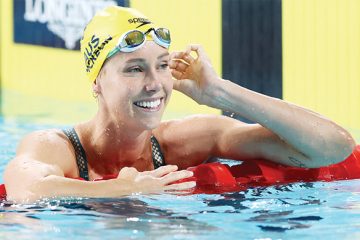Sports Desk : dhakamirror.com
Transgender women will no longer be allowed to compete in female track and field events regardless of their levels of testosterone, World Athletics President Sebastian Coe says.
No female transgender athlete who had gone through male puberty would be permitted to compete in female world ranking competitions from March 31, Coe said.
However, the organization also said it will also form a working group to look at the issue of transgender inclusion for 12 months, suggesting the ban may not be permanent.
In a statement announcing its decision, World Athletics said it consulted with “various stakeholders” in January and February, including member federations, the Global Athletics Coaches Academy and Athletes’ Commission, the International Olympic Committee, and transgender and human rights groups.
“There was little support within the sport” for allowing trans women to compete as long as they maintained testosterone levels below 2.5 nanomoles per liter of blood for two years prior to competition.
The organization announced that equal testosterone levels will be required of female intersex athletes, and effectively bans South African runner Caster Semenya and other cisgender women with naturally elevated testosterone levels from competing unless they are taking hormone-suppressing drugs, which can cause it that they feel sick.
“There are currently no transgender athletes competing internationally in athletics, and consequently no athletics-specific evidence of the impact these athletes would have on the fairness of female competition in athletics,” wrote World Athletics. “Under these circumstances, the Council has decided to prioritize the fairness and integrity of female competition before inclusion.”
World Athletics also acknowledged that the topic needs further research. For this purpose, a working group will be set up to deal with the topic for a year. The group will include “an independent chair, up to three council members, two athletes from the Athletes’ Commission, one transgender athlete, three representatives from the member federations and representatives from the World Athletics Health and Science Department.”
The group will consult specifically with transgender athletes to get their input, and will also review and commission additional research to help fill knowledge gaps about transgender inclusion in women’s sport. The group will then submit a report with recommendations to the World Athletics Council.
“Decisions are always difficult when there are conflicting needs and rights of different groups,” said World Athletics President Sebastian Coe. “We will be guided by the science surrounding physical performance and male advantage that will inevitably develop in the years to come. As more evidence becomes available we will review our position, but we believe the integrity of the female category in athletics is of paramount importance.”
World Athletics’ announcement comes as other sports governing bodies figure out their own trans policies.
Last June, the International Rugby League (IRL) announced a temporary ban on trans women from women’s matches as it conducts investigations and finalizes its inclusion policies. Shortly before the IRL’s announcement, FIFA and World Aquatics (formerly FINA) both announced bans on trans athletes from women’s events.
That same month, the German Football Association – Deutscher Fußball-Bund eV (DFB) – announced rules that would allow trans, intersex and non-binary players to choose whether to play on men’s or women’s soccer teams. The following month, British Triathlon announced its plan to force trans women and non-binary athletes to compete alongside cis men in an “open” category.
In August 2022, the World Boxing Council banned transboxers from fighting cisgender opponents. The organization’s president, Mauricio Sulaiman, announced the council’s intention to create separate sections just for trans men and trans women if there is enough interest among trans boxers.
In the US, Republicans have drafted numerous bills nationwide that would ban trans women from competing on girls’ and women’s teams. Despite this, 176 female professional athletes signed a Court Amicus Brief in support of allowing trans women to play on sports teams that conform to their gender identity.
– Input from lgbtqnation.com was used in this article.





